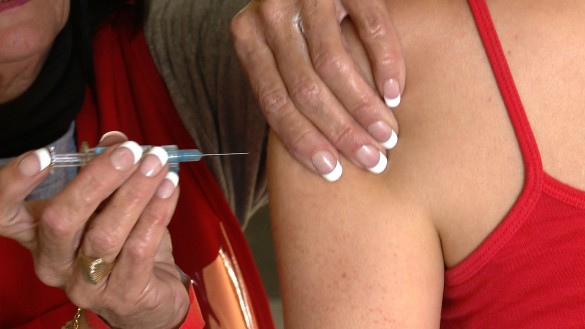Kathryn Edwards, M.D., director of the Vanderbilt Vaccine Research Program, has received a $307,000 grant from the Bill & Melinda Gates Foundation to study the immune responses of pregnant women who receive the Tdap (reduced-dose acellular pertussis vaccines combined with tetanus and diphtheria toxoids) vaccine.
The grant, the program’s first from the Gates Foundation, will supplement an ongoing Vanderbilt-led study that is looking at the safety of Tdap boosters in pregnant women. The study is funded by more than $1 million in awards from the Centers for Disease Control and Prevention (CDC).
“This is very exciting,” said Edwards, professor of Pediatrics and the Sarah H. Sell and Cornelius Vanderbilt Chair.
Edwards and others in the program are testing how pregnant mothers tolerate repeated dosing with the Tdap booster during pregnancy. The idea is that mothers will pass on antibodies to the diseases the vaccine targets — tetanus, diphtheria and pertussis — to their unborn children.

Pertussis, commonly known as whooping cough, is resurging, and newborn babies who are not old enough to receive vaccines are at highest risk for severe morbidity and mortality from pertussis.
Edwards said the earlier-funded portions of the research have enabled Vanderbilt and the study team to test the safety of the vaccine regimen. The Gates grant will enable the team to measure the antibodies that the mothers in the study produce.
“By looking at the antibodies that the mothers produce, then we’ll have a very good idea of how much they’ll give to the baby,” she said.
Vanderbilt is the primary site for the CDC-funded study and has enrolled nearly all of the 250 pregnant women who will be part of it locally, Edwards said.
“We’re also enrolling 150 non-pregnant women to compare immune responses in those that are pregnant and non-pregnant, and also the safety (of the vaccine regimen) in those as well.”
Participants in the study are receiving standard/routine prenatal care in addition to receiving an additional blood draw prior to the Tdap vaccination and one month following. The women are also asked to record any symptoms during the first seven days after receiving the vaccination. Mothers and babies will be followed for six months after delivery.
“The Tdap vaccine protects mothers and babies from whooping cough,” said Karen Broder, M.D., the CDC’s lead for the Clinical Immunization Safety Assessment (CISA) Project and lead CDC investigator on the Tdap safety study with Vanderbilt. “Previous studies support the safety of giving Tdap vaccine to pregnant women. As part of good public health practice, we continually monitor the safety of vaccines, and this new grant builds upon the CDC-funded study to help us further understand women’s immune responses to the vaccine.”
Under current guidelines, Tdap is recommended for all pregnant women, ideally between 27 and 36 weeks gestation, based on data that antibodies begin to cross the placenta around 18 weeks with peak times during 30-32 weeks of gestation.
The vaccination guidelines for children call for a total of five doses of the pediatric DTaP (diphtheria-tetanus-pertussis) vaccine — at 2 months, 4 months, 6 months, between 15-18 months and between 4-6 years.















